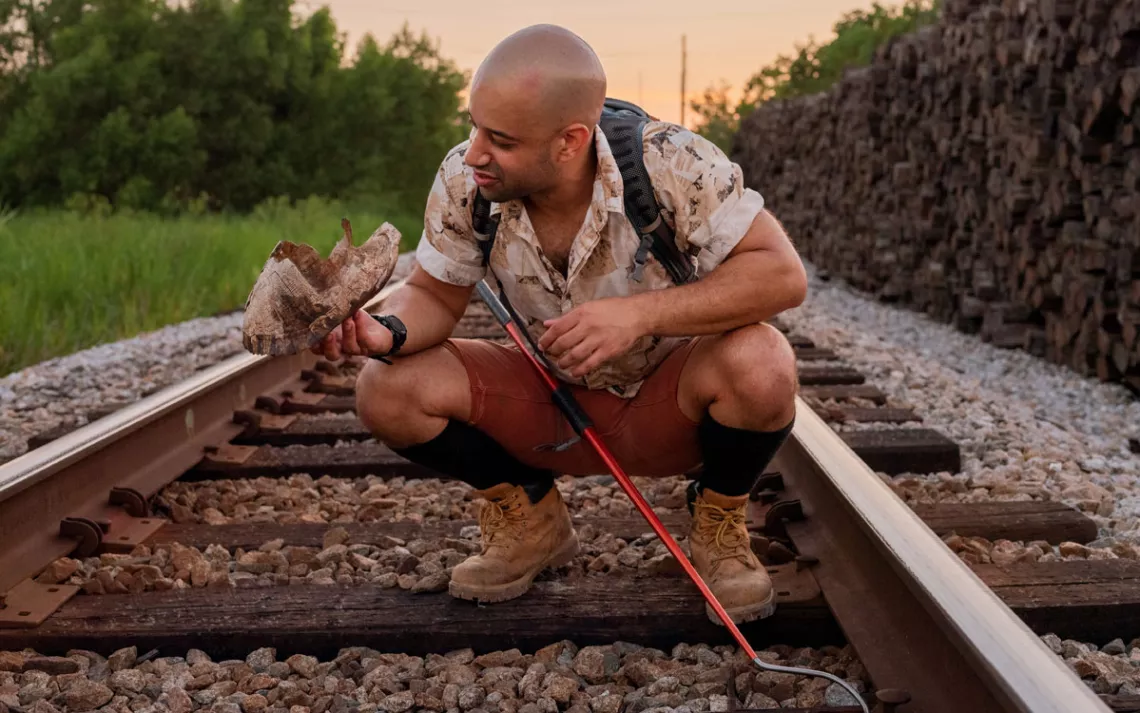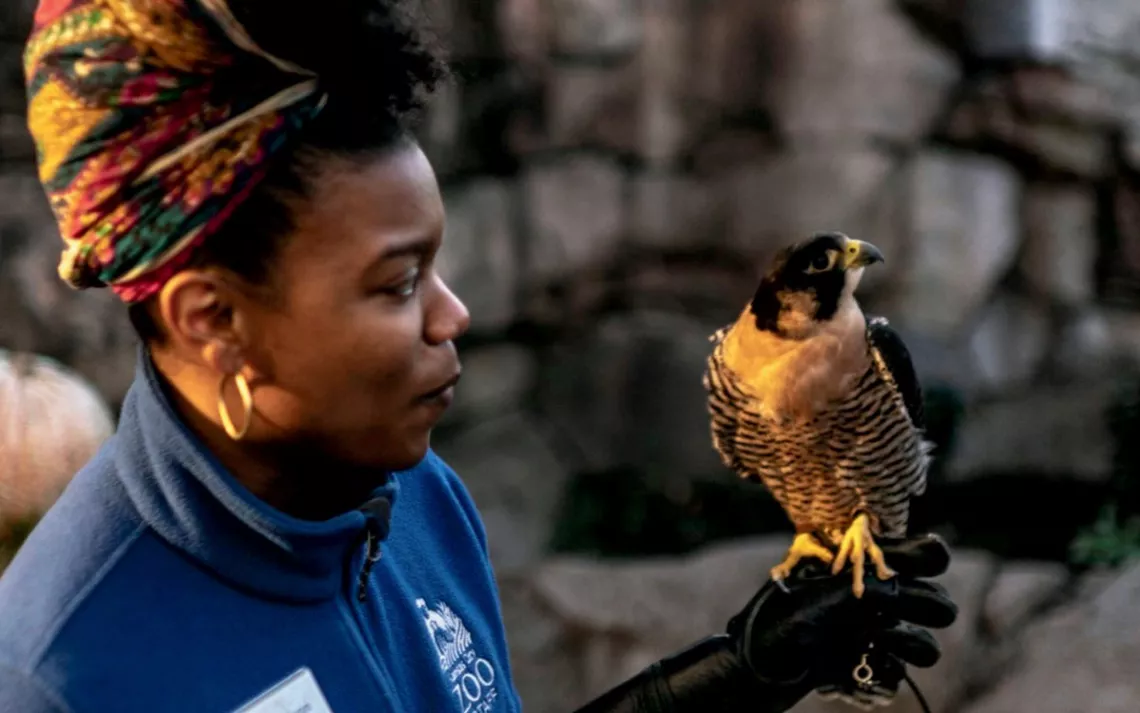"We Out Here" Showcases People of Color in the Science Community
Zookeeper Alexi Grousis uses his podcast and social media to reach new audiences

Photo by Camille Farrah Lenain
As a kid, Alexi Grousis reveled in exploring the lake and grassy hills near his home in Fresno, California. "Any time that I was out in wild spaces, I felt exhilarated," he says. His passion for wildlife led him to study biology at the University of Missouri and then to work as a zookeeper and wildlife educator in New Orleans. When he started, he was the zoo's only Black zookeeper and longed to connect with people who looked like him.
It wasn't until 2017, when Grousis started using Twitter for more than posting memes, that he realized just how many other people of color were working with wildlife—and how many felt a similar lack of connection with their colleagues. Both in and out of the field, Grousis and other BIPOC wildlife professionals were often made to feel as though they didn't belong in nature.

Allison Jones holds a peregrine falcon named Eli. Courtesy of The Kansas City Zoo.
By 2019, Grousis was part of an active online group chat with several prominent Black scientists, zookeepers, and naturalists, in which topics ranged from pay disparities to the unique experiences of Black professionals within the science community. "We would bounce ideas off each other and discuss shared experiences," he says. "If I was at work and I thought I'd experienced that microaggression, I would pose it to the group chat and be like, 'Am I tripping or is this real?'"
These concerns were commonplace in the group chat but were rarely discussed in mainstream media outlets. That changed in spring 2020 when a Black man named Christian Cooper was harassed by a white woman in New York's Central Park while birding. The incident, caught on video, sparked a national conversation about the dangers Black people face when they're out enjoying nature.
Grousis and others in his group chat were inspired to use their platforms to elevate the voices of Black people in nature and science. They created a grassroots collective called the BlackAFinSTEM Collective as well as Black Birders Week, an online campaign designed to put a spotlight on Black nature enthusiasts and raise awareness about the challenges they face in the outdoors.
Their online advocacy received widespread attention and support from groups such as the National Audubon Society, the Monterey Bay Aquarium, and the National Wildlife Federation—the latter publicly pledged to expand its Conservation Fellowship and Internship Programs to create more opportunities for young scientists of color.
Being able to communicate and connect with other scientists who looked like him made him "feel seen," Grousis says. He's been working to grow this community through digital advocacy and media so that more people like him also feel visible and know that nature is meant to be enjoyed by everyone.
When the media-savvy zookeeper started flexing his knowledge of wildlife on Twitter, his personal musing and hot takes were a hit. Known by his 19,000 followers as David AttenBruh, he has gained popularity by posting, among other things, humorous memes and anecdotes about animal behavior.
In a characteristic post, Grousis chronicled the escapades of the "petty ass elephants" at the zoo. One elephant in particular had a bad habit of throwing rocks at dogs. "Homegirl Leah hated dogs. Like she beefed hard with 'em. And no one quite knew why," he wrote. "Leah had this mean ass throw. If she found a stone, she could bop it from 20 to 30 yards away with that rude ass underhand toss elephants do."
The success of his online presence drove Grousis to take his advocacy one step further. In 2021, he teamed up with Allison Jones, an artist, actor, and former wildlife educator. Together they created the We Out Here Podcast, dedicated to sharing the stories of people of color in nature.
Episodes range from Grousis and Jones riffing on camping as kids to in-depth interviews with guests about their personal journeys into science, often revealing shared experiences. Although the podcast covers heavy topics such as institutional racism, it remains lighthearted. The hosts bring a positive attitude and a distinctly millennial sense of humor to the show, including a mix of bizarre animal facts, insights into the experiences of people of color in nature, and bouts of contagious laughter.
Grousis strives to make content that inspires others to not only connect with nature but also share that connection with the world so that people like him will never feel like they don't belong. He keeps his day job and public persona separate, affording him a level of autonomy in the work that he does off the clock. That advocacy and organizing, Grousis says, represents a personal philosophy rather than his job.
Grousis and Jones dream about adapting their podcast for an animated show. For now, the pair are working on the second season and engaging with the growing community around it.
"I want Black, brown, and Indigenous people to listen and feel seen, but I also want them to feel like they can submit a story," Grousis says. "Too many people are afraid to submit stories. I'm telling you all now, if you got a story, just send it in. We want to hear it! Don't feel like you're too small or that you're a nobody. You are somebody, so send that story in."
 The Magazine of The Sierra Club
The Magazine of The Sierra Club



